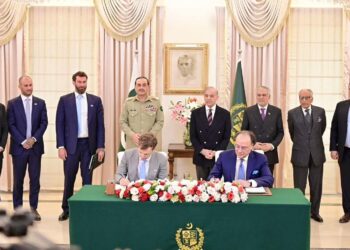Overview of the Incident
In a tragic incident that has once again highlighted the grave risks migrants face in pursuit of better livelihoods, a migrant boat capsized off the coast of eastern Libya on April 12, resulting in the loss of at least 11 lives. Among the deceased, four have been confirmed to be Pakistani nationals, according to an official report submitted by the Pakistani Embassy in Libya to Pakistan’s Ministry of Foreign Affairs.
The boat sank near the city of Siret, specifically off the Harawa Coast, an area frequently used by human traffickers to transport migrants attempting to reach Europe. The recovery operation was carried out by local Libyan authorities who managed to retrieve 11 bodies from the scene of the wreck.
Details of the Pakistani Victims
Out of the 11 deceased, four were identified as Pakistani citizens based on national identity documents found with the bodies. A team from the Pakistani Embassy visited the site to assist in the identification process and confirmed the following individuals as victims of the tragic incident:
- Zahid Mahmood, son of Liaquat Ali, from Gujranwala
- Sameer Ali, son of Raja Abdul Qadeer, from Mandi Bahauddin
- Syed Ali Hussain, son of Shafqat Al-Hussain, from Mandi Bahauddin
- Asif Ali, son of Nazar Muhammad, from Mandi Bahauddin
The embassy has reported that efforts are underway to identify two additional bodies, while five of the deceased have been confirmed as Egyptian nationals.
Embassy Response and Coordination
Following the tragedy, the Pakistani Embassy in Tripoli promptly engaged with local authorities to gather more information and provide necessary support for repatriation and further investigations. The embassy has remained in contact with the families of the victims and is coordinating efforts to return the bodies to Pakistan for proper burial, depending on the wishes of the next of kin.
Context: Migration Crisis in Libya
Libya has become a major transit point for migrants from Asia and Africa trying to reach Europe via the Mediterranean Sea. Ongoing conflict, political instability, and the lack of a functioning central government have made Libya a hotspot for human trafficking and illegal migration.
Smugglers often exploit vulnerable migrants by promising them safe passage to Europe in exchange for exorbitant fees. These journeys are typically conducted in overcrowded and unseaworthy boats, lacking safety equipment and navigational aids, putting the lives of passengers at immense risk.
The Human Cost of Irregular Migration
This incident adds to a long list of maritime disasters in the Mediterranean. Thousands of people have perished in recent years trying to cross from North Africa to Europe. According to the International Organization for Migration (IOM), over 2,500 migrants died or went missing in the Mediterranean in 2023 alone.
For Pakistani nationals, the route through Libya is increasingly being used as a gateway to Europe. Many young men from rural and underdeveloped areas fall prey to traffickers who lure them with promises of jobs and a better life abroad. Unfortunately, the reality is often exploitation, imprisonment, or death.
Government Efforts and Challenges
The Pakistani government has repeatedly warned citizens against illegal migration and continues to conduct awareness campaigns about the dangers involved. However, limited economic opportunities and high unemployment continue to push many towards these perilous journeys.
Pakistani authorities have also been working with international organizations and countries like Libya to crack down on human smuggling networks. Yet, the effectiveness of such measures remains limited without regional stability and strong border enforcement.
International Response and the Need for Solutions
The international community has long called for comprehensive strategies to address irregular migration, focusing on both immediate humanitarian assistance and long-term development goals. While rescue operations and refugee support systems are in place, more needs to be done to prevent such tragedies from occurring in the first place.
Organizations such as the United Nations High Commissioner for Refugees (UNHCR) and IOM continue to provide aid and work on safe migration routes. However, given the scale of the crisis, solutions require coordinated efforts across nations to dismantle trafficking networks and create legal pathways for migration.
Conclusion: A Call for Preventive Action
The recent boat tragedy near Libya’s Harawa Coast is a sobering reminder of the dangers associated with irregular migration. With four Pakistani lives lost and families plunged into grief, the incident underscores the urgency of addressing the root causes driving people to undertake such dangerous journeys.
Authorities in Pakistan and beyond must strengthen their commitment to combat human trafficking and provide viable alternatives for those seeking better economic opportunities. At the same time, international partnerships are essential to ensure that no more lives are lost at sea due to desperation and false promises.

























